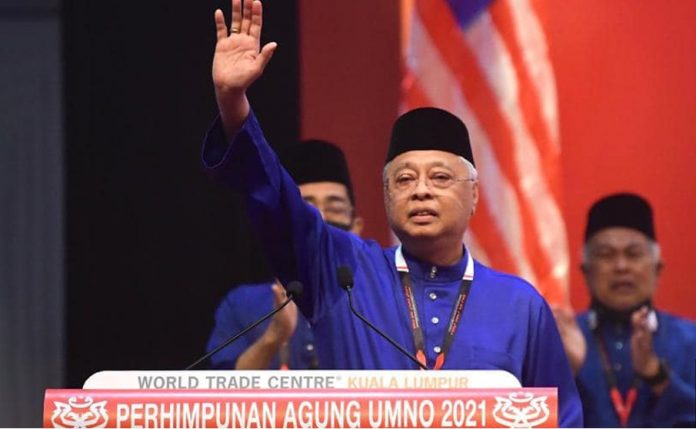UMNO and Prime Minister Ismail Sabri are hoping to take credit for recent announcements on hiking the minimum wage and allowing special withdrawals from retirement savings, but the devil is in the details.
Come 1 May 2022, Labour Day, Malaysia’s lowest-paid employees will receive a minimum monthly wage of RM1,500 (S$479), up from the current RM1,200 (S$383) in cities and towns, and RM1,100 (S$351) elsewhere. From 20 April 2022, Malaysia’s retirement savings scheme or the Employees’ Provident Fund (EPF) started disbursing RM40 billion (S$13 billion) in cash to members who had applied for special withdrawals from their accounts.
The United Malays National Organisation (UMNO) and Prime Minister Ismail Sabri — who holds the Vice-President post in UMNO — are likely hoping that the beneficiaries would remember these measures that were announced at UMNO’s General Assembly (GA) in mid-March 2022.
Malaysia’s minimum wage, since its introduction in 2013, has been raised incrementally. The latest increase of RM300 for urban salaries marks the steepest hike. It is timely, as rising prices for basic necessities have disproportionately impacted low-income workers while exacerbating the hardship they have faced.
Ismail Sabri relayed in his GA address how he had personally heard the grievances of financially stressed households and the debates of UMNO delegates, before announcing the much-awaited government decision at the ’sacred’ hall (Dewan Keramat) where his audience was gathered, to a rapturous ovation.
The other prominent pro-Rakyat policy was to permit EPF account holders to make a special withdrawal of up to RM10,000 (S$3,191) from their accounts. Even though the announcement was livestreamed from the Prime Minister’s Office in Putrajaya, it coincided with the first day of the party’s GA.
This fourth tranche of EPF withdrawals was first broached by former prime minister and UMNO MP Najib Razak, who spoke in Parliament on November 2021 proposing to increase the maximum withdrawal amount from EPF as a ‘last special withdrawal’. Other UMNO leaders subsequently backed the policy. While opposition Pakatan Harapan had at first criticised Najib’s statement, with MP Ong Kian Ming describing it as a ploy by UMNO leaders to avoid imprisonment for their corruption charges, PH’s leaders changed their tune. Anwar Ibrahim and Lim Guan Eng supported this EPF withdrawal in early March 2022, ostensibly after receiving feedback from Johoreans during state election campaigning.
However, this populist gamesmanship from Ismail Sabri might cause more troubles down the road for UMNO and Malaysia’s economy.
Ismail Sabri was determined that UMNO — and he personally — be credited for both policies. His announcement to grant the EPF special withdrawal occurred in a context where pressures were mounting from BN, while the opposition threw their weight behind this proposal. Ismail Sabri flatly declared that the decision on EPF special withdrawals could not be publicised during the Johor election lest doing so allowed other parties to claim credit. He saw the UMNO GA as the opportune moment, even though the EPF issue was discussed with UMNO president Zahid Hamidi as early as March 2022 during Johor polls. It is interesting that Ismail Sabri credited Zahid with the idea even though Najib first championed the initiative. Ismail Sabri might have been making a conciliatory move to appease Zahid, who has been calling for a snap general election. As party president, Zahid would have control over the party’s candidate list, while Ismail Sabri would technically need Zahid’s endorsement to stand for re-election as an UMNO MP.
Co-opting public policy for partisan popularity occurs even in advanced democracies. Then UK Chancellor Sajid Javid, in the 2019 Conservative Party Conference, announced that the minimum hourly wage in the United Kingdom would rise to £10.50 (S$19) from the existing £8.21 (S$15) within five years. However, this populist gamesmanship from Ismail Sabri might cause more troubles down the road for UMNO and Malaysia’s economy.
On the minimum wage, implementation gaps have followed the hasty announcement about the raise. Crucial details, such as the waiver granted to tourism operators and businesses with less than five employees, trickled out only weeks later. Whereas previous minimum wage orders were gazetted at least three weeks before the effective date, the current order has yet to be formalised. Furthermore, the sensible tiered structure of urban and non-urban rates introduced in 2020 seems to have been removed — without debate. Finally, the Employment Act amendment passed by the Upper House on 30 March 2022 reduced ‘working hours’ from 48 to 45 per week. As the hourly minimum wage is calculated based on the definition of a work week, there is a significant difference depending on whether RM7.70 per hour for 45 hours per week or RM7.22 per hour based on 48 hours per week is used as the standard for Malaysian workers from 1 May 2022.
On the EPF special withdrawal, this latest round of disbursements is worrisome, considering the dire state of EPF savings. EPF chief strategy officer Nurhisham Hussein said in late 2021 that 54% of EPF members at the age of 54 old had less than RM50,000 in their accounts, which is clearly insufficient retirement income. The lack of adequate savings is particularly acute among low-income Malaysians, the slice of the electorate which has traditionally responded favourably to UMNO compared to wealthier voters. Even though UMNO may win favour from the Rakyat in the immediate term, the decision to permit EPF special withdrawals in 2022 will hollow out retirement savings for millions of workers.
UMNO can reasonably expect the Rakyat, in the immediate term, to credit the party for its present blessings. However, given its ambition to remain as the governing party, UMNO needs to consider how to replenish and safeguard the rapidly declining retirement savings of its poorest supporters. Failing to do so would create new pressures for the ruling coalition in time to come, and its leaders would then be called to account. By KEVIN ZHANG|LEE HWOK-AUN/ FULCRUM




